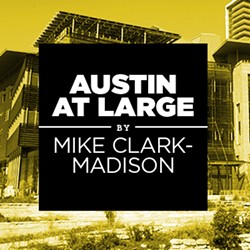Austin @ Large: Austin at Large
The Limits of the Law: Will the City Charter Survive the Courthouse?
By Mike Clark-Madison, Fri., Feb. 8, 2002

That's when the lawsuit brought by the Austin Police Association and the Combined Law Enforcement Associations of Texas, seeking to overturn the term limits imposed on City Council incumbents by the city charter, will have its expedited day in court. In the view of the APA, among others, the charter's requirement that incumbents collect signatures from 5% of Austin voters (about 20,000) to bust term limits is clearly in conflict with the Texas Election Code, which says they only need one-half of 1% of the turnout in the last mayoral election (in this case, about 300).
Are they right? The Texas Secretary of State has already said no, that the charter and the code are not "clearly" in conflict, which means something in court. But thanks in large part to the execrable quality of law-writing in both charter and code, Covington's job is not so simple.
Points to consider:
What is an "application"? The Election Code says, straight up, that home-rule cities like Austin can impose specific requirements upon prospective candidates for municipal office, such as term-limit provisions. Many Texas cities have term limits, but Austin is the only one to include an escape clause for incumbents -- go collect thousands of signatures to show the depth of the public's love for you, and we'll let you on the ballot.
If the voter-approved 1994 measure had included some other public display of affection -- letters of recommendation, Daryl Slusher sound-alike contests, whatever -- we would not be going to court now. But any candidate, incumbent or not, also has to submit signatures, or else pay a filing fee, as part of an "application" to be on the ballot. The charter does not say whether incumbents need to collect their thousands of sigs in addition to, or in lieu of, those required for application, and the Election Code -- whose current language was adopted in 1985 -- says its one-half-of-1% provision applies to "any application." Through this morass the APA hopes to drive its legal truck.
What is "unmistakable clarity"? This is not the first time Austin has been sued over laws that conflict with the state's wishes. In the case that eventually upheld the legality of the Save Our Springs Ordinance, the Texas Supreme Court held that, if the Legislature wants to abrogate a city's home rule powers, it has to state this intent with "unmistakable clarity" in its statutes. Neither the charter nor the code is "unmistakably clear" about anything, but Austin's SOS position -- one that concurs with decades of Texas case law -- was that if there was any doubt, the court had to defer to the home-rule powers of the city.
What does it matter? The Election Code says a ballot application requires "a minimum" of 25 votes or one-half-of-1%, whichever is greater. It does not specify a maximum, though it did before 1985. Moreover, it's not clear that, if the 5%-of-the-voters provision is illegal, the Three Amigos could waltz onto the ballot -- as the APA lawsuit seeks in its request for injunctive relief. It could, rather, mean that there is no escape clause whatsoever. Bye-bye, Slusher, Goodman, and Griffith. Thanks for coming.
Looking for Adversaries
So the APA may be wasting its time; the union's president Mike Sheffield noted when the lawsuit was filed that "people should still be collecting their signatures, because this may fall flat on its face." Unfortunately, reformers fear, it may be the city law department that decides to take a flop. Despite Austin's valiant defense of SOS, there is precedent for the city to take a powder.
The current campaign-finance ordinance, sponsored by Austinites for a Little Less Corruption and passed in 1997, originally imposed its $100 contribution limits not only on candidates but also on issue-oriented political action committees. When the Greater Austin Chamber of Commerce challenged this in court, the city's lawyers told the judge, basically, that they agreed with the plaintiffs, and out the law went. "That's not the duty of a lawyer for the city," says lawyer Fred Lewis of Campaigns for People, who wrote the ALLC ordinance. "The system relies on an adversarial process; if they couldn't argue the case, they should have found a disinterested outside lawyer who would."
Dark rumors swirled even before the APA filed its suit that the incumbents were trolling for someone to challenge the law, and that the city legal department would acquiesce. As conspiracy theories go, this one has some holes -- the police union is hardly the city's lapdog, and the APA has its own reasons for seeking to chill the power of the charter. Plus, one would hope our august incumbents are savvy enough to see that such a transparent dodge could backfire with devastating force.
The suspicions of skullduggery have already left some reformers, like Lewis, in the position of defending a law they personally don't support. Term limits are proof that democracy and populism are not the same thing. If we want informed, intelligent voters, we should not presume they're too stupid or irresponsible to know when someone's been in office too long.
And the Austin escape clause, seen by backers as an improvement over normal term limits, actually gives the game away. The point of our law is not to bring new people and new ideas into the process, or to ensure that people don't burn out in office (the best argument for term limits on the presidency), but specifically to target incumbents, who have to prove they deserve to run again, which means they must be bad. And so we have the wasteful mess we're in now. But does that justify getting rid of term limits by any means necessary?
We'll find out Friday. ![]()
Got something to say on the subject? Send a letter to the editor.








